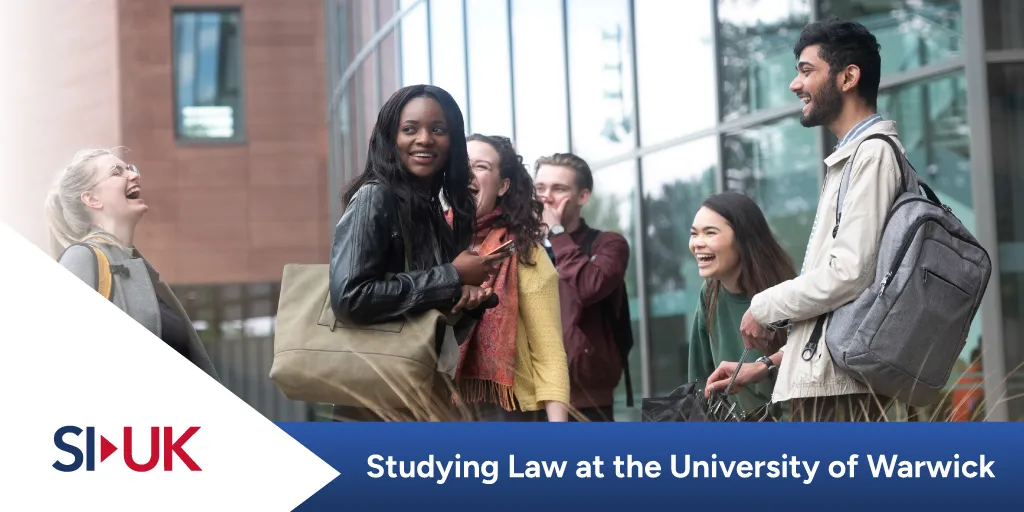The University of Warwick’s Bachelor of Law (LLB) degree offers an in-depth understanding of legal principles and their societal roles. Students study legal judgments, statutes, and treaties, understanding how economic, cultural, and political changes impact law. The programme emphasises the broader effects of law beyond the courtroom, focusing on its influence on economic and social life and relationships between states, governments, and individuals. Warwick Law School pioneered the contextual study of legal rules, examining their social, political, and economic implications.
Entry requirements
General entry requirements for Warwick’s LLB degree are:
- IB diploma: 38 points.
Study law at the University of Warwick
Learn more about the University of Warwick’s Law LLB below. To apply, contact SI-UK for a free consultation today.

Why Study Law at the University of Warwick?
Learn more about the University of Warwick Law LLB below.
1. Renowned Law School
Established in 1968, Warwick Law School now hosts over 1000 students and 70 full-time staff, making it one of the UK's leading law schools. Known for high teaching standards and research quality, the school promotes a robust research culture. It started a contextual approach to legal education, integrating law with economic, cultural, and political analysis. Students explore the broader societal impacts of law alongside studying legal judgments and statutes. It is ranked 10th in the UK by the Guardian University Guide 2024 and 17th in the UK by QS World University Rankings 2024 for Law & Legal Studies.
2. Course Structure and Modules
Warwick's LLB curriculum offers an all-around legal education emphasising core skills and interdisciplinary understanding. In the first year, core modules provide a solid foundation in legal skills. In the second and final years, students continue with core modules and can select optional modules to suit their academic interests. Modules are half modules (one term) or full modules (two terms). Students undertake a dissertation or supervised project in the final year, replacing a half or full module.
Year One
-
Criminal Law
- Understanding general principles and societal operations of criminal law.
- Examining concepts, procedures, theories, and debates within English criminal law.
- Emphasis on historical, political, and social contexts.
-
Tort Law
- Study of civil liability for wrongful damage or injury.
- Focus on judicial law-making processes and societal relevance.
- Development of legal reasoning and critical judgment skills.
-
Understanding Law in Context
- Introduction to Law at Warwick, exploring "Law in Context" as a concept.
- Overview of English legal methods and system.
- Emphasis on legal theory, participatory and problem-based exercises.
-
Law, State, and the Individual
- Study of sources of law and foundational concepts.
- Analysis of law's relationship with politics, economics, and society.
- Participatory and problem-based learning.
Year Two
-
Contract Law
- Fundamental principles of contract law.
- Study of contract lifecycle topics (formation, performance, remedies).
- Integration of theoretical knowledge and key legal skills.
-
Property Law
- Principles of English land law and its applications.
- Analysis and critique of cases and statutory provisions.
- Development of research and collaborative skills.
Optional modules and foundations of EU Law if pursuing a barrister qualification.
Year Three
Supervised Project
- Independent study resulting in a researched dissertation or other outputs.
- Emphasis on self-directed learning, critical reflection, and feedback.
- No set syllabus; support through general skills-based workshops.
Optional Modules
Example optional modules include:
- Social Theory of Law
- Human Rights in Practice
- Gender and the Law
- Climate Change and Law
- Corporate Tax Law
- Family Law
- Introduction to Criminology
- International Economic Law
- Medicine and the Law
- Law of Business Organisations
- Data Law and Governance
- Legal Aspects of the Digital World
- Art and Cultural Heritage Law
3. Competitive international tuition
International student annual fee:
- Band 1 – £24,800 per year (classroom-based courses, including Humanities and most Social Science courses)
- Band 2 – £31,620 per year (laboratory-based courses, plus Maths, Statistics, Theatre and Performance Studies, Economics, and courses provided by Warwick Business School, with exceptions)
4. Diversity and inclusivity
Warwick Law School is a diverse and inclusive community, with over 1,000 students across undergraduate, postgraduate, and PhD programmes. Seventy per cent of students identify as female, surpassing the sector average, and 64% of undergraduates and 68% of postgraduates are BAME. International students comprise 38% of the undergraduate body, hailing from 55 countries, and over half of postgraduate students are international.
Warwick values widening participation, with 20% of first-year undergraduates entering through contextual offers. The faculty is also diverse, and the school is dedicated to equality and inclusion. Recognised with an Athena Swan Silver Award in 2024, Warwick Law School leads in addressing gender inequalities and fostering inclusive cultures.
5. Scholarship options
Warwick Law School offers a range of scholarships to support talented students pursuing advanced legal studies. These scholarships provide significant financial assistance to domestic and international students, including full tuition fees and stipends.
LLM Scholarship
- Amount: Full LLM fee
- Eligibility: Must have applied for one of the LLM programmes
PhD Scholarship
- Amount: Full fees plus a stipend for three years
- Eligibility: Must have applied for the PhD programme
Commonwealth Shared Scholarship
- Awarded By: University of Warwick and Commonwealth Scholarship Commission
- Amount: Full LLM fee plus a stipend
- Eligibility: Must have applied for the LLM in International Development Law and Human Rights; other conditions apply
Leverhulme Trust Doctoral Scholarship
- Awarded By: University of Warwick & Leverhulme Trust
- Amount: Full fees plus an annual stipend
- Eligibility: UK and International PhD students
6. Career-oriented teaching
Warwick Law School combines lectures, seminars, and workshops with online materials for effective learning. Lectures introduce topics, while seminars and practical exercises deepen understanding. Innovative teaching methods include experiential learning, reflective journals, and dramatised dissertations. Research training and personal development are integral parts of the degree.
The school's contextual approach offers opportunities for law-related work outside the curriculum, with ample support and advice provided. Core module lectures host around 300 students, seminars around 16, and workshops involve 20 to 30 students, ensuring a dynamic and engaging educational environment.
7. Wide-ranging programme options
Warwick Law School offers diverse law programmes designed to various interests and career goals. These include the standard Law (LLB) and an extended Law (4 Year) (LLB) programme. Specialised options include Law with Study Abroad in English (LLB), Law and Sociology (BA), Law with French Law (LLB), Law with German Law (LLB), and Law with Humanities (BA).
In addition, the interdisciplinary Philosophy, Politics and Law (PPL) (BA) degree is also available. These programmes provide students with extensive legal education and the opportunity to integrate law with other disciplines, preparing them for various professional paths.
Study Law at Warwick
Are you interested in studying law at Warwick University? Arrange a free consultation to begin your journey today.
FAQ
What is Warwick University best known for?
Warwick University is renowned for its high academic standards, advanced research, and strong focus on practical studies. The university is particularly esteemed for its business, economics, and law programmes. Warwick Law School is noted for its contextual approach to legal education, integrating law with societal, political, and economic issues.
Are there any specific scholarships available for Indian students pursuing law at Warwick University?
Indian students can apply for scholarships such as the LLM Scholarship and PhD Scholarship. Additionally, once confirmed, the GREAT Scholarship and Commonwealth Shared Scholarship may have eligibility criteria that include Indian nationals.
Can Indian students work part-time while studying law at Warwick University?
Indian students can work part-time while studying at Warwick University. International students on a student visa can typically work up to 20 hours per week during term time and full-time during vacations, provided the work does not interfere with their studies.
Are there any Indian student associations or clubs at Warwick University?
Warwick University has an active Indian Society that organises cultural events, social gatherings, and festivals. The society provides a supportive community for Indian students, helping new students acclimate to life at Warwick and offering opportunities to connect with fellow Indian students.
What career prospects can Indian students expect after graduating from Warwick University's law programme?
Indian students graduating from Warwick University's law programme can expect healthy career prospects. The university's reputable law degree is recognised globally, providing opportunities in various legal fields such as corporate law, international law, human rights, and academia. Graduates often secure positions in prestigious law firms, multinational corporations, NGOs, and government agencies.
How is the campus life and accommodation for Indian students at Warwick University?
Campus life at Warwick University is vibrant and diverse, with numerous clubs, societies, and events. Accommodation options range from on-campus residences to private rentals, catering to different preferences and budgets.
What is the application process for Indian students looking to study law at Warwick University?
Indian students can apply to Warwick University's law programmes online. For undergraduate programmes, applications are typically made via UCAS, while postgraduate applications are submitted directly to the university. The process involves submitting academic transcripts, English proficiency test scores (like IELTS), a personal statement, and reference letters. Some programmes may require additional documents or an interview.



 I sincerely thank SI-UK for getting me accepted to UCL. The MSc in Urban Development and Planning is extremely competitive, but the right guidance provided by SI-UK made my dream of studying at University College London a reality. The services were exceptional from beginning to end.
I sincerely thank SI-UK for getting me accepted to UCL. The MSc in Urban Development and Planning is extremely competitive, but the right guidance provided by SI-UK made my dream of studying at University College London a reality. The services were exceptional from beginning to end. 

